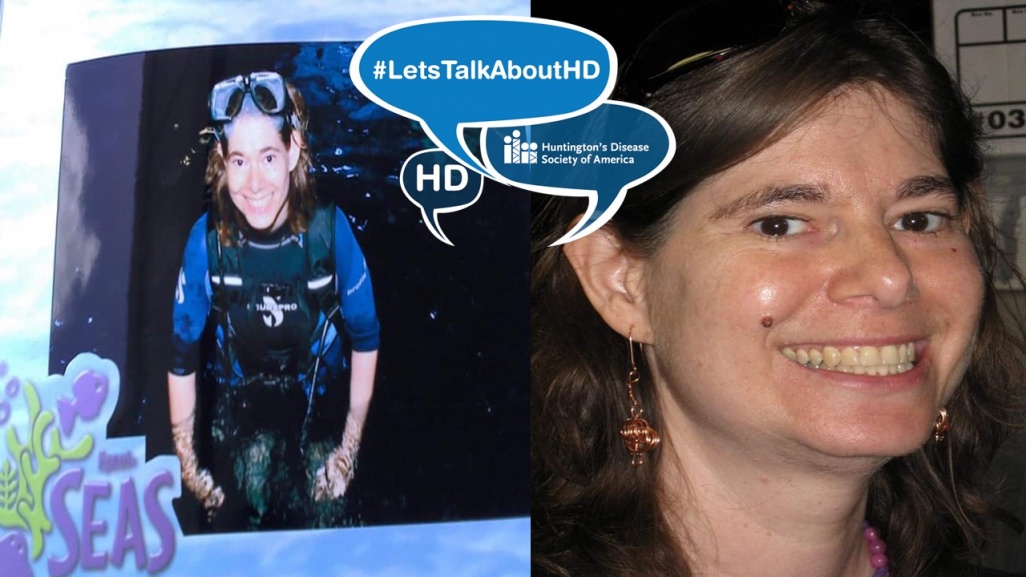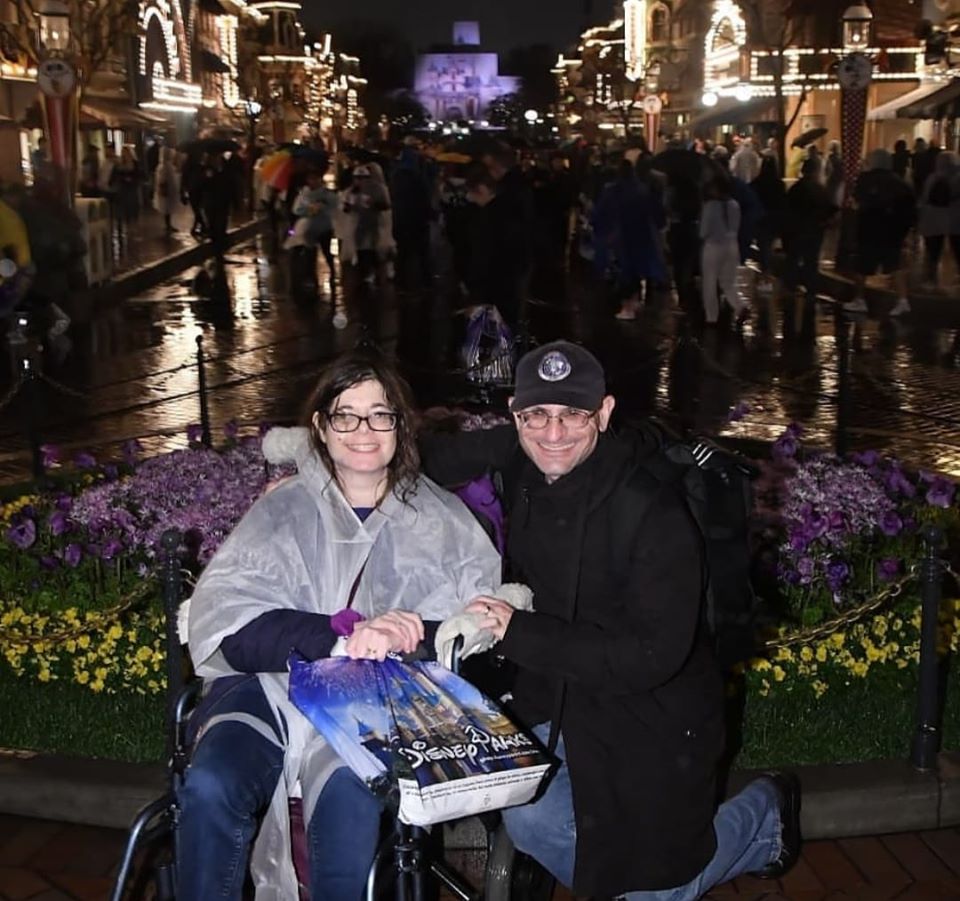
By Matthew Santamaria (msantamaria@hdsa.org)
Savanna Briggs works at an annual trade show. She released a five-part story on Facebook talking about one of her favorite strangers at the show… Ethan Idenmill.

“He was so kind, polite, and courteous and he is our most loyal trade show customer,” said Savanna. “Every year he is one of the first people at our booth with a long list of all the items he needs, then he stops by every single day after that to get even more stuff from us.”
One year, Savanna noticed that Ethan brought his wife, Jess, who was in a wheelchair. According to Savanna, that was the last thing that she noticed as the true love of Ethan and Jess was evident. They have been married for more than twenty years.

“They were in their own little bubble and it was the sweetest thing in the world to watch them interact. I realized that Ethan is a caregiver for his wife,” Savanna explains. “I'm also a caregiver for people I love very much, so combined with how I felt about him already, I felt we had a huge part of our lives in common, so I reached out.”
Savanna learned that Jess tested positive for the gene that causes Huntington’s disease (HD). This is a fatal genetic disorder that causes the progressive breakdown of nerve cells in the brain. It deteriorates a person’s physical and mental abilities usually during their prime working years and has no cure.
Before the diagnosis, Jess went four years without an answer. Ethan and Jess climbed to the top of a castle in Ireland. She was able to do it with no assistance. As the symptoms developed, she was slowly losing her ability to walk. Jess would soon need a cane or a walker to go just a few feet. However, she would continue to fall which resulted her to be in a wheelchair.
"The worst part before the diagnosis was not knowing,” Ethan explains. “It was always accompanied by the slimmer and slimmer hope that something could be found that would be effective. It was torture. Now, it's a different kind of torture because the not knowing isn't about can they treat what she has but how long does she have.”
In 2014, Jess started to develop symptoms of HD. This is described as having ALS, Parkinson’s and Alzheimer’s diseases – simultaneously. Symptoms include personality changes, mood swings, depression, forgetfulness, impaired judgement, unsteady gait, involuntary movements, slurred speech, difficulty in swallowing, and significant weight loss.
“One of the things I am dealing with right now, kind of constant, is essentially, grieving over Jess,” said Ethan. “She is still with me, but she is not who she was even a couple of years ago. And our lives together will never be the same. It's a bit like losing her piece by piece."
The decision to get genetically tested is difficult to make. Each year, 5-10% are tested. It is never the right or wrong decision to be tested. There are people that see no benefit in knowing that they will develop the disease while others want to know in order to make informed choices about their future. It can take up to several weeks to receive your results from the genetic testing center.
“She became a registered vet tech, but she started showing symptoms after she graduated,” said Savanna. “She was never able to do anything with this new advancement in her life.”
Savanna was moved by the family’s story and is now a volunteer for HDSA. She wants help people in the HD Community and to show others they are not alone in this battle.

Ethan has a message for the HD Community:
“The result is that as someone affected or as their caregiver, you will be confronted by decisions that will cause you to bend even personal rules and beliefs that you thought were rock-solid. Because if you don't learn to bend, you will break. And this disease will break you if you let it.”
###
Huntington’s disease is a fatal genetic disorder that causes the progressive breakdown of nerve cells in the brain. It deteriorates a person’s physical and mental abilities usually during their prime working years and has no cure. Every child of a parent with HD has a 50/50 chance of inheriting the faulty gene that causes Huntington’s disease. Today, there are approximately 41,000 symptomatic Americans and 200,000 at-risk of inheriting the disease. In less than 10% of cases, juvenile Huntington’s disease (JHD) affects children & adolescents. JHD usually has a more rapid progression rate than adult onset HD; the earlier the onset, the faster JHD progresses. HD is described as having ALS, Parkinson’s and Alzheimer’s diseases – simultaneously. HD is characterized by a triad of symptoms, including progressive motor dysfunction, behavioral disturbance and cognitive decline.
The Huntington’s Disease Society of America is the premier nonprofit organization dedicated to improving the lives of everyone affected by HD. From community services and education to advocacy and research, HDSA is the world’s leader in providing help for today and hope for tomorrow for people with HD and their families.
To learn more about Huntington’s disease and the work of the Huntington’s Disease Society of America, visit www.HDSA.org or call 1(800)345-HDSA.
This is a story featuring a personal experience with Huntington’s disease. If you would like to have your story told please contact Matthew Santamaria at msantamaria@hdsa.org
Savanna Briggs works at an annual trade show. She released a five-part story on Facebook talking about one of her favorite strangers at the show… Ethan Idenmill.

“He was so kind, polite, and courteous and he is our most loyal trade show customer,” said Savanna. “Every year he is one of the first people at our booth with a long list of all the items he needs, then he stops by every single day after that to get even more stuff from us.”
One year, Savanna noticed that Ethan brought his wife, Jess, who was in a wheelchair. According to Savanna, that was the last thing that she noticed as the true love of Ethan and Jess was evident. They have been married for more than twenty years.

“They were in their own little bubble and it was the sweetest thing in the world to watch them interact. I realized that Ethan is a caregiver for his wife,” Savanna explains. “I'm also a caregiver for people I love very much, so combined with how I felt about him already, I felt we had a huge part of our lives in common, so I reached out.”
Savanna learned that Jess tested positive for the gene that causes Huntington’s disease (HD). This is a fatal genetic disorder that causes the progressive breakdown of nerve cells in the brain. It deteriorates a person’s physical and mental abilities usually during their prime working years and has no cure.
Before the diagnosis, Jess went four years without an answer. Ethan and Jess climbed to the top of a castle in Ireland. She was able to do it with no assistance. As the symptoms developed, she was slowly losing her ability to walk. Jess would soon need a cane or a walker to go just a few feet. However, she would continue to fall which resulted her to be in a wheelchair.
"The worst part before the diagnosis was not knowing,” Ethan explains. “It was always accompanied by the slimmer and slimmer hope that something could be found that would be effective. It was torture. Now, it's a different kind of torture because the not knowing isn't about can they treat what she has but how long does she have.”
In 2014, Jess started to develop symptoms of HD. This is described as having ALS, Parkinson’s and Alzheimer’s diseases – simultaneously. Symptoms include personality changes, mood swings, depression, forgetfulness, impaired judgement, unsteady gait, involuntary movements, slurred speech, difficulty in swallowing, and significant weight loss.
“One of the things I am dealing with right now, kind of constant, is essentially, grieving over Jess,” said Ethan. “She is still with me, but she is not who she was even a couple of years ago. And our lives together will never be the same. It's a bit like losing her piece by piece."
The decision to get genetically tested is difficult to make. Each year, 5-10% are tested. It is never the right or wrong decision to be tested. There are people that see no benefit in knowing that they will develop the disease while others want to know in order to make informed choices about their future. It can take up to several weeks to receive your results from the genetic testing center.
“She became a registered vet tech, but she started showing symptoms after she graduated,” said Savanna. “She was never able to do anything with this new advancement in her life.”
Savanna was moved by the family’s story and is now a volunteer for HDSA. She wants help people in the HD Community and to show others they are not alone in this battle.

Ethan has a message for the HD Community:
“The result is that as someone affected or as their caregiver, you will be confronted by decisions that will cause you to bend even personal rules and beliefs that you thought were rock-solid. Because if you don't learn to bend, you will break. And this disease will break you if you let it.”
###
Huntington’s disease is a fatal genetic disorder that causes the progressive breakdown of nerve cells in the brain. It deteriorates a person’s physical and mental abilities usually during their prime working years and has no cure. Every child of a parent with HD has a 50/50 chance of inheriting the faulty gene that causes Huntington’s disease. Today, there are approximately 41,000 symptomatic Americans and 200,000 at-risk of inheriting the disease. In less than 10% of cases, juvenile Huntington’s disease (JHD) affects children & adolescents. JHD usually has a more rapid progression rate than adult onset HD; the earlier the onset, the faster JHD progresses. HD is described as having ALS, Parkinson’s and Alzheimer’s diseases – simultaneously. HD is characterized by a triad of symptoms, including progressive motor dysfunction, behavioral disturbance and cognitive decline.
The Huntington’s Disease Society of America is the premier nonprofit organization dedicated to improving the lives of everyone affected by HD. From community services and education to advocacy and research, HDSA is the world’s leader in providing help for today and hope for tomorrow for people with HD and their families.
To learn more about Huntington’s disease and the work of the Huntington’s Disease Society of America, visit www.HDSA.org or call 1(800)345-HDSA.
This is a story featuring a personal experience with Huntington’s disease. If you would like to have your story told please contact Matthew Santamaria at msantamaria@hdsa.org
